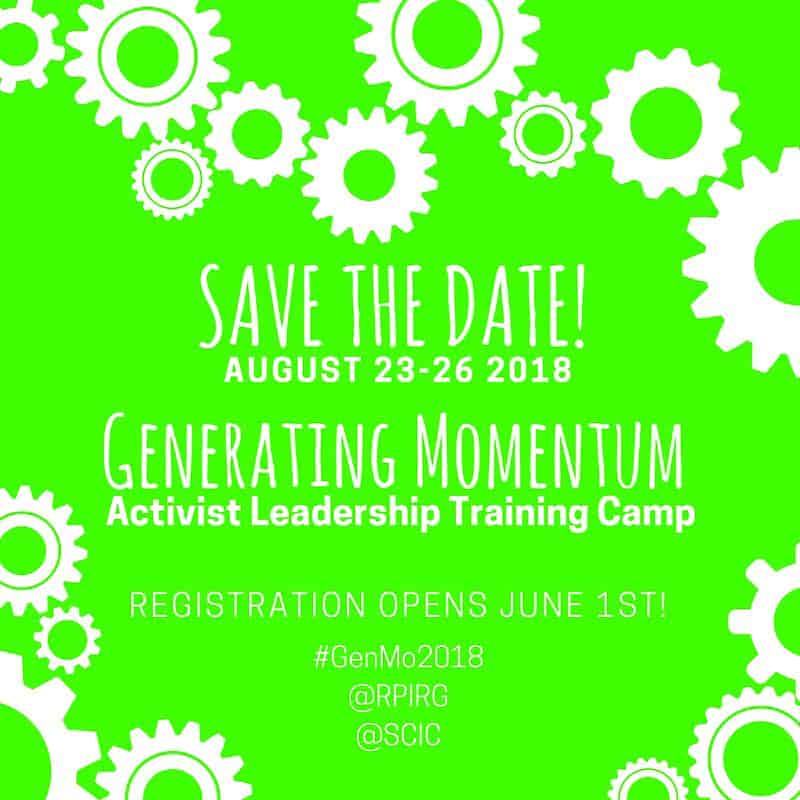Apathy Into Action has its 11th year of success

author: taylor balfour | news writer

Makin’ moves in the student activist scene credit RPIRG
RPIRG’s annual event continues to support activism in the community
Every year, the Regina Public Interest Research Group (RPIRG) puts on Apathy Into Action: a conference which promotes thoughtful conversation and activism in Saskatchewan communities.
“Apathy Into Action is one of our annual events that we hold in order to just increase participation and connection between students and justice work going on in our community,” Julian Wotherspoon, the Outreach and Events Coordinator at RPIRG, explains.
“There was two days of just really great programming that featured a lot of people working to make Regina and Canada and the globe a generally better place.”
The 2018’s Apathy Into Action event is the 11th time the event has taken place at the U of R. While the first day of the event was drop-in, Saturday events required registration. Despite the difference, both days had successful turnouts.
“I think it was very successful,” Wotherspoon explains. “We just carried a really great lineup of people talking about a diverse set of ideas and I think at our peak we had standing room only in the RIC atrium. It went really well.”
“Our Friday’s events are always just drop-in; we don’t push a registration,” she continued. “Saturday is more registered programming. We had a good turnout for that, as well. We offered three different workshops that were very well attended.”
RPIRG, according to their website, “is a student funded resource centre at the University of Regina committed to social and environmental justice.”
The group aims to educate students on how to be active in their communities, and give them the skills needed to further change their surroundings.
“I think RPIRG is in a really great support position as far as harnessing the passion and the power and the expertise that students on campus have to affect change in their community, and just playing a supporting role or a connecting role as much as possible,” Wotherspoon continues.
“I think it’s really easy for students and for young people to feel disconnected from systems of power or that idea that we can make change, and that’s not true. We want to make sure that people know that they can get out there and do those things.”
Some journalistic organizations like USA Today and the Atlantic, argue that student activism is once again making a comeback and that we may potentially be in the “golden age of college student activism.”
Alia Wong, a journalist for USA Today, argues that it may be because we are living in an era that is less tolerant of sexual assault, racial violence, and student debt and, therefore, are more vocal about their disapproval of it and the stories surrounding them.
RPIRG’s hope is to give students the skills and abilities to continue their activism, and to challenge the organizations in power if they believe it’s time for change.
“We really want to make a civic engagement or an engagement in community as accessible as possible for as many students as possible, and I think that’s really important,” Wotherspoon says.
Closer to home, an example of such a change is the election of the provinces new premier, Scott Moe.
Many in the province are expressing grievances with aspects of Scott Moe’s campaign, including his connections with the Regina Pro-Life movement and the warning of another tough budget to be announced later this year.
“We got rid of one big name but, I mean, it’s still the same system that’s in power,” Wotherspoon explains.
“As young people, it’s really easy for us to feel defeated or feel like those systems are so big and monolithic or to be dismissed by people within those structures as ‘you’re just young, you’re just a student.’ We know that that’s not true and we want to inspire other students to know that that’s not true.”
RPIRG holds other events other than Apathy for Action, however, like their annual summer camp.
“Another event we host on an annual basis is the Generating Momentum Activist Leadership Training Camp and it’s more of a retreat-style camp,” Wotherspoon explains. “A lot of our goals and some of the material are similar to what we saw at Apathy Into Action, but it’s a retreat-style camp.”
“There’s a beach, there’s fires at night sometimes, we roast marshmallows, all those things, but we partner on that event with another organization in the province called SCIC or the Saskatchewan Council for International Cooperation and we really see that as a great opportunity again to connect youth in Saskatchewan with the skills and the connections that they need to be leaders and to be confident in their role as leaders.”
If students want to get more involved with RPIRG, Wotherspoon says there are a few ways students can get involved.
“Attending events is always great, but we are always jazzed when people come in and say that they want things to do,” Wotherspoon says. “At any given time, we either are spearheading projects or supporting student groups who are doing projects, and we’re always willing to make connections between students who really have the energy and want work that they can do, whether that’s here with one of our projects or again with one of our working groups.”
“Board elections are coming up,” she says. Another great way to get involved. “You don’t have to have experience sitting on a board in the nonprofit sector but it’s a great way to gain that experience.”
RPIRG’s goal has always been to help students, and these events have been placing activist students into the right hands.
Krystal Lewis, the Executive Director of RPIRG, says that through everything, she just wants the organization to continue to help students.
“We want students to be excited about volunteering, doing things, whether we connect them with people or we help train them to do something, we want people to not feel intimidated by getting involved in things,” she explains.
“However we can make that happen, we’ll do our best.”









